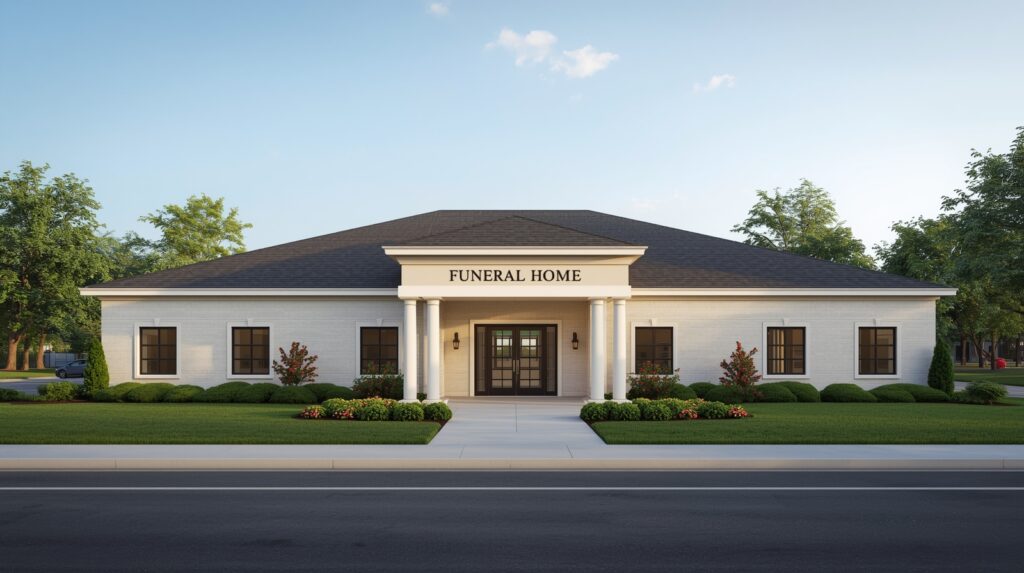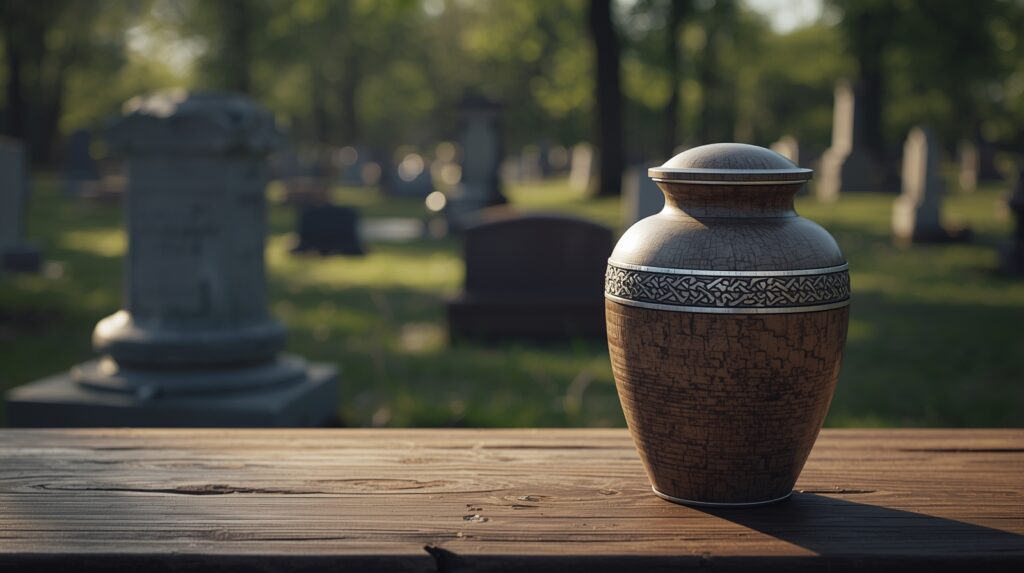
Funeral Homes have been a big part of life in America, and in other parts of the world, for at least 150 years. And in many ways they have followed all the trends of the modern age as they have evolved into what is now a multi-billion dollar industry led by a handful of very large companies. In the age before funeral homes and funeral directors, many families conducted memorial services entirely unassisted. From preparation of a body to the publicizing of a funeral service to the actual burial, all of the services that family now routinely assigned to professionals in a funeral home were once conducted almost exclusively by members of a deceased person’s family.
Now, as is the case with many other aspects of modern life, experts at funeral homes can be hired in just about any locale by just about any family to conduct these same services. (It is interesting to note that, just as in the days of old, many families are taking advantage of modern technology to arrange all aspects of the funeral for their loved one, themselves. This is because the FTC’s Funeral Rule has greatly helped level the memorial industry, which has allowed outside memorial companies offer funeral products for significantly lesser prices. This is especially seen on memorial websites that offer cremation urns, cremation jewelry, headstones, and even caskets, among other funeral needs. More on the Funeral Rule later.)
We will start our overview of funeral homes with a brief summary of some of the many – and ever growing – services that the modern funeral home is able to provide for families stricken by the loss of a loved one. We will then offer an overview of the types of funeral homes in operation today and a brief history of how funeral homes have developed into the large-scale business that they are today. Then, finally, we will offer those in need of a funeral home a few tips on how to locate one suitable for their needs and what sort of rules and regulations they can be expected to follow.
Funeral homes today are typically set up to spring into action from the moment a death occurs. Most funeral homes will work with hospitals to arrange for the transfer of a body to their facilities and then work with family members to arrange a comforting series of events that, together, comprise a traditional memorial service. Here are just some of the events that most funeral homes are equipped to coordinate and, in most cases today, even host.
Embalming: While this service is not always necessary (and some religious and environmental groups even advise against it), funeral homes typically make it available to families who wish to see their loved one’s body displayed gracefully in an open casket during the main funeral service. Embalming services today are probably most often used in cases in which a body has been seriously disfigured, but it is also sometimes used when a body is intended to be moved from one city to another before final burial. Consumer advocates will often remind families who have lost a loved one that, while embalming is sometimes thought of as a way to delay the decay of a body that has been buried, there is no evidence to support any claims that it does, in fact, do that. (This is why, in fact, most states and municipalities have overturned laws requiring embalming be done for sanitation reasons.) Embalming is almost always an optional service that funeral homes are equipped to provide to families wanting their loved one to be at his or her cosmetic best for a funeral.
Viewing (also known as a Wake): people of our modern culture tend to be comforted by having an opportunity to spend one last moment with a deceased loved one or friend before the body is committed to Earth. So, funeral homes today, are almost always able to offer a viewing service, a few hours (or even days) before the formal funeral ceremony is scheduled. At a viewing, family and friends are invited publicly to visit the funeral home (or any other place that a family and the funeral director arrange) and file in to see the deceased person’s body on display and pay final respects. Perhaps the most important function of a viewing ceremony is that it provides family members an opportunity to gather and visit. Most who work in a funeral home will likely tell you that many viewing ceremonies end up turning into impromptu family reunions, complete with the lighthearted, fun-filled atmosphere that accompanies just about any other love-filled family gathering. The viewing ceremony has been hailed by many experts on grief to be a key element in any plan for coping with the loss of a loved one in a healthy way.

Obituaries: Funeral homes are the traditional source today for obituaries that appear in local newspapers. Funeral home staff members are typically very familiar with the standard procedures of placing death announcements in local newspapers (and, in fact, to prevent acts of fraud or other mischief, many newspapers now have policies against running obituaries that come to them from a non-funeral home source). So, writing and placing obituary announcements has now become a very routine service offered by today’s funeral homes. In this age of easy electronic communication, many funeral homes have begun posting obituaries on their own websites as well as in local newspapers. (An interesting side note is that this development has proven to be a problem for many small-town newspapers that once relied on obituary announcements as a big readership draw. Many of their town’s residents who have moved away now can simply check obituaries on the local funeral home’s website instead of subscribing to the paper, and that has certainly affected the newpaper’s bottom line – many of which have opted to begin charging more for obituaries, thereby giving funeral homes even more incentive to post the announcements, solely, on their own sites.)
Luckily, and again thanks to the advantage of our modern technology, there are many tribute websites that offer families to share obituaries with friends and family near and far. What is all the more impressive about these tribute websites, is that they offer more personalization than the traditional obituary. For example, instead of posting one (often) short paragraph, and perhaps one photo, families can post a number of stories and information (including times and dates of services), as well as nearly any photograph of the dearly departed. It is not unimaginable that soon, these tribute websites will be the main source in which families can share the obituary of their loved ones.
Cremation: Most funeral homes today are able to arrange for cremation and/or conduct the cremation itself. Cremation is becoming an ever more popular option, and, to remain competitive, funeral homes have almost universally adapted. Funeral homes that are run by large corporations will typically offer cremation on its own premises (albeit the cremations are often done in a central location that serves several of the corporation’s funeral homes at once), but even funeral homes that do not have cremation facilities of their own are usually well acquainted with a local crematory to which it hires on a contract basis to serve its customers.
Burial: As with cremation, most funeral homes today also can either provide directly or arrange for burial in a cemetery. Again, many funeral homes run by large corporations also own cemeteries in which families can bury their loved ones immediately after a funeral service. But individually-run cemeteries are still quite common in the United States as well as elsewhere, and funeral homes typically work closely with the operators of all cemeteries in their local area to find a burial spot most suitable for their loved one. It is important for families to remember that federal law specifically requires that funeral homes work with any cemetery that a family selects and that, under no circumstances, may a funeral home require (or even hint) that a family must use a particular cemetery after their service.

Funeral Service: As you see, the main part of a funeral home’s service, the funeral service itself, is just a start of what a funeral home does. But, nevertheless, it is the main event. A funeral home can be counted on to assist family’s in all aspects of planning a fitting memorial service: arranging clergy and other speakers, organizing transportation to a burial spot for all in attendance, decorating a chapel, greeting visitors, and the list goes on. In a time of grief, minding the details of a such a large-scale even can be overwhelming even for the most hardy of souls, and this is perhaps the area in which most customers of a funeral home end up being most thankful.
While funeral homes are not necessarily formally classified into “types,” for our present educational purposes, it’s useful to think of funeral homes in terms of the following categories.
Individually owned funeral homes: These establishments were long the life-blood of the funeral home industry, and for many it is heartening to know that they are still relatively common. While most funeral homes in America (and indeed throughout the developed world) probably do belong to our next category, a surprising number of family-run operations do still exist today providing caring, loving, friendly funeral services for their communities. The majority of these individually owned funeral homes tend to be located in very small towns that executives for the large operations have determined they cannot serve profitably, and it is important to note that, many small, independent funeral homes have chosen to sell their businesses to the larger firms which, for public relation’s reasons, elect to keep the same name and management intact. And, in some cases, managers of these establishments sign contracts promising their new employers that they will not advertise the firm’s new owner to the world. So consumer advocates often advise customers that, just because a funeral home seems to be independent at first glance doesn’t mean that it really is. If hiring a truly independent funeral home is important to you, then you should be sure to ask the funeral home employees who, in fact, owns the company they work for. Employees are prohibited by law from lying about this when asked directly, and few will even attempt to do so.
Corporate-run funeral homes: Most funeral homes today are run by one of just a handful of large corporations that have turned funerals into a large-scale industry by aggressively buying thousands of funeral homes over the last 10-15 years. The largest of the funeral home operators is Houston-based Service Corporation International, which operates thousands of formally independent funeral homes across the country and also licenses the “Dignity Memorial” brand” to small franchisees who operate under SCI’s tutelage and oversite. While many customers of a corporate-run funeral home are never aware of the firm’s parent company, the quality-control advantages that come from dealing with any company that has a large infrastructure and plenty of financial power are always at hand.
Transfer Service: A relatively new type of funeral home is not technically a funeral home at all (in fact, it is legally prohibited from calling itself a funeral home because it does not have the proper licensing). If you’re considering options beyond the traditional funeral, you can explore alternatives to traditional funerals to find a service that best fits your family’s needs. Transfer services are the best choice for families that don’t want to have a memorial service or who want to organize their own. These services simply arrange for a deceased loved one’s body to be transferred from a hospital or morgue to a cemetery, crematory, or whatever other place the family has arranged (though most areas have laws regarding that).
For anyone searching for a funeral home, a few great organizations exist to help. Probably the most helpful organization is the Funeral Consumer’s Alliance, a non-profit group devoted to teaching families about the many funeral business practices (that are not always in the best interest of the consumer) and to helping families find the best funeral home for their needs. After the FCA, another great source of information to help find a good funeral home is state and local government. Most states have commissions that license and regulate funeral homes, and these groups can provide a great deal of consumer information upon request. And, yet another good place to turn for advise on choosing a funeral home is to your local church community. Most churches host a good number of funerals in any giving year, and pastors tend to work fairly closely with local funeral directors just by the nature of their professions. Pastors and other church personnel can often be excellent sources of helpful information about funeral homes, but consumers should be at least somewhat wary when using this option. While it is usually illegal to do so, some funeral homes and churches have been known to make “kick-back” deals for referrals. The vast majority of funeral home operators and pastors would never enter into this type of arrangement, of course, but a consumer would be wise to always be wary.
In general, funeral homes are an excellent resource for organizing the exact service that your family needs to perfectly memorialize your loved one. And they can usually help you at every single step of this difficult, challenging time any anyone’s life.
